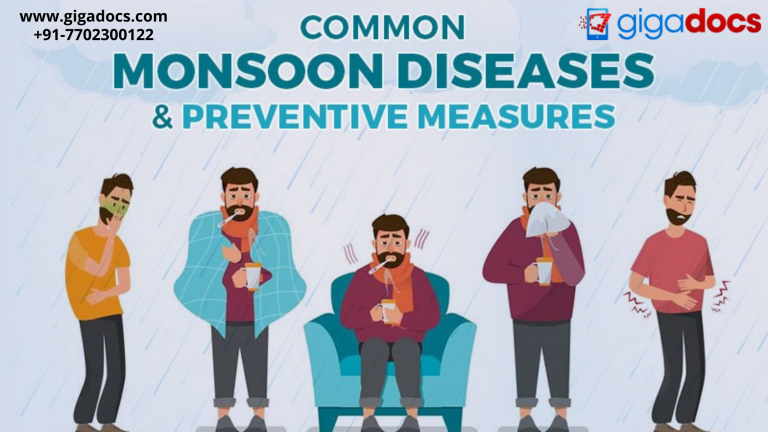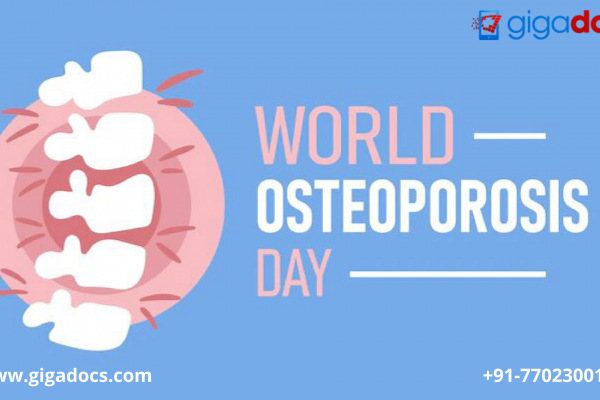During the monsoon, your chances of contracting various viruses, germs, and other diseases doubles. The high moisture content in the rainy season encourages the transition of hazardous germs, leading to a spectrum of diseases and disorders.
Many of these infections go unnoticed and untreated until they have a substantial detrimental impact on one’s health. Early detection and a few simple preventive and hygiene steps will keep you safe throughout this monsoon. In this blog, we discuss the most common monsoon diseases, food hygiene, water sanitation tips, and how to avail a teleconsultation for seasonal flu, gastroenteritis, non-chronic and chronic diseases.
Common Diseases of the Rainy Season
Mosquitoes, water, air, and contaminated food are the most common disease carriers during the monsoon season. Let us discuss them in detail-
Mosquito-borne Monsoon diseases
Mosquitoes and mosquito-borne diseases thrive during the monsoon season.
No wonder that India contributes significantly to mosquito-borne diseases, accounting for 34% of global dengue infections and 11% of global malaria cases.
- Malaria– Monsoon marks the mosquito breeding season for the malaria-causing parasite Anopheles minimus. This mosquito breeds in water channels and streams and causes a severe fever that can go as high as 105 degrees Celsius and lasts many days.
- Dengue- This fever is spread by the Aedes aegypti mosquito, which thrives in flowerpots, wells, buckets, and drums. The Aedes aegypti mosquito has adapted to changing landscapes and urbanization and can thrive in urban dwellings. Dengue fever takes four to seven days to develop after being bitten, whose initial symptoms include fever and tiredness.
- Chikungunya-A non-fatal viral disease spread by the Aedes albopictus mosquitoes which can attack you not just at night, but also during the day. The symptoms include rheumatic pain in the joints and bones and stiffness.
Water-borne Diseases
Rains mean overflowing drains and consequent water-borne diseases. According to the WHO, water-borne infections infect more than 3.4 million people in India. Because their immune systems are still developing and prone to infections, children are the most vulnerable among the victims. The following are the most frequent water-borne diseases:
- Typhoid– It is caused by inadequate sanitation and eating contaminated food. To keep Typhoid away, consume freshly made food and boiled, treated, or filtered water.
- Cholera- Is an illness attributed to poor sanitation and the intake of contaminated food. Early signs include diarrhea and loose bowel movements.
- ● Leptospirosis- During the monsoons, contact with unclean water or muck/mud causes leptospirosis, also known as Weil’s Syndrome. Shivers, muscle soreness, headache, and fever are the symptoms of leptospirosis. If you have a cut or bruise, make sure to cover them with a band-aid before you leave the house.
- Jaundice- A waterborne disease that is spread by contaminated food and water, besides poor sanitation. It causes liver damage, weakness and exhaustion, yellow urine, yellowing of the eyes, and vomiting.
- Gastro-intestinal infections-The ingestion of old, exposed, or contaminated food especially street food can cause gastro-intestinal diseases like vomiting, and gastroenteritis. To avoid stomach infections, boil water before drinking, keep all meals covered and avoid street food.
- Hepatitis A- Transmits by contaminated food causing the liver to become inflamed and damaged. This results in exhaustion, fever, stomach discomfort, yellow eyes, dark urine, and a sudden loss of appetite.
Airborne Diseases
The monsoon brings airborne infections such as the common flu, viral fever, cold, cough, and sore throat spread by germs through the air. In adults, they are usually mild; seniors and children, on the other hand, are more susceptible to airborne sicknesses due to their weakened or developing immune systems. The following are the most frequent airborne illnesses:
- Cold- This is the most prominent viral infection caused by the sudden temperature changes during the monsoon. A person with a weakened immune system, such as one recuperating from Covid, is more susceptible to seasonal colds. A runny nose, sore throat, watery eyes, fever, and chills are some of the symptoms.
- Influenza-Influenza, also known as the seasonal “flu,” rapidly spreads from person to person, primarily through the air.
Food hygiene, Water sanitation Tips for the Monsoon Season
- Install mosquito netting at the windows.
- Don’t let water stagnate or accumulate anywhere in and around your house.
- Ensure hygiene by cleaning your bathrooms regularly.
- Before leaving the house, apply mosquito repellants or lotions.
- Doctors advise drinking as much boiled water as possible and avoiding raw, undercooked, or stale food left cooked for a long period.
- Maintain personal hygiene, but do not stop there; cleaning food and utensils mitigates the risk of illness.
- If symptoms persist, drink plenty of rehydrating drinks, especially homemade ORS- simple to make and highly effective.
- One must avoid aerated drinks because they can aggravate discomfort.
- Curd and yogurt, are high in probiotics and can be taken to cure chronic symptoms.
- Complications of inflammatory bowel disease are more common in children and the elderly. Thus, make sure kids and seniors always eat hygienic and fresh food.
Monsoon Diseases and Doctor Consultations
Antibiotics & self-medication should be avoided at all costs. Consult a doctor if you have a fever, excessive vomiting, mucus, or blood in your stools. Gigadocs app is here to help you avail the services of expert teleconsultations from the comfort of your own home, without any infectivity risk scare.
Gigadocs is a practice management system that helps you to book expert specialists for seasonal illnesses, chronic and non-chronic ailments, such as an orthopedic specialist, cardiologist, pulmonologist, and gastroenterologist, directly from the app.
Download the Gigadocs app make an appointment for yourself and your loved ones-
- IOS App – apple.co/2W2iG4V
- Android App – bit.ly/33AQoRC
To know more and schedule a demo, e-mail, at info@gigadocs.com




